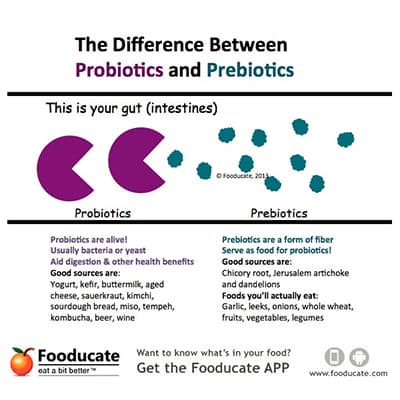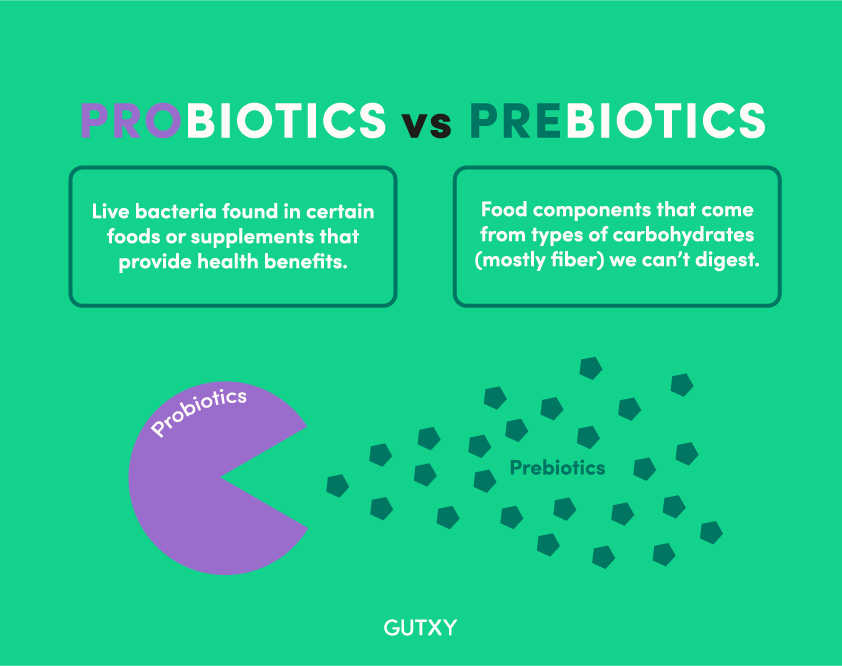Have you ever wondered why some foods make you feel energized and others leave you sluggish? The secret often lies in your gut health, which is where prebiotics and probiotics come into play.
Understanding these two powerful allies can transform the way you feel every day. You’ll discover what prebiotics and probiotics really are, how they work together, and why they matter for your overall well-being. Keep reading to unlock the simple steps you can take to boost your health from the inside out.
Prebiotics Basics
Prebiotics are a key part of gut health. They are non-digestible fibers that feed good bacteria in the gut. Unlike probiotics, prebiotics do not contain live bacteria. Instead, they help the existing bacteria grow and thrive. Understanding prebiotics helps you support your digestive system naturally.
Sources Of Prebiotics
Prebiotics are found in many common foods. Foods like garlic, onions, and leeks are rich in prebiotic fibers. Bananas, asparagus, and whole grains also provide these fibers. Including these foods in your diet helps nourish your gut bacteria.
How Prebiotics Work
Prebiotics pass through the stomach without being digested. They reach the colon where good bacteria ferment them. This fermentation produces short-chain fatty acids. These acids feed the cells in your gut and lower inflammation. Prebiotics help maintain a healthy balance of bacteria.
Benefits For Gut Health
Prebiotics improve digestion and increase nutrient absorption. They support the immune system by promoting good bacteria growth. A healthy gut can reduce the risk of infections and inflammation. Prebiotics may also help with bowel regularity and reduce bloating.
Probiotics Essentials
Probiotics are live bacteria that benefit health. They live mainly in the gut. These good bacteria help keep the digestive system balanced. They also help the body fight harmful germs. Understanding probiotics helps you choose the right foods and supplements.
Common Probiotic Strains
Different probiotics have different effects. Some common strains include Lactobacillus and Bifidobacterium. Lactobacillus helps break down lactose in dairy. Bifidobacterium supports the immune system. Saccharomyces boulardii is a good yeast probiotic. Each strain has unique benefits for the body.
How Probiotics Support Digestion
Probiotics help digest food better. They produce enzymes that break down nutrients. These bacteria keep the gut lining healthy. They reduce symptoms like bloating and gas. Probiotics also help absorb vitamins and minerals. A balanced gut means better digestion and comfort.
Impact On Immune System
Probiotics strengthen the immune system. They teach the body to fight bad bacteria. These good bacteria increase the production of antibodies. They also reduce inflammation in the gut. A strong immune system means fewer infections. Probiotics keep the body ready to defend itself.
Differences Between Prebiotics And Probiotics
Prebiotics and probiotics are often talked about together. Both support gut health but serve different purposes. Understanding their differences helps you choose the right approach for a healthy digestive system.
Role In Gut Microbiome
Probiotics are live bacteria that add good microbes to your gut. They help balance the natural bacteria inside your digestive system. Prebiotics are types of fiber that feed the good bacteria already living there. They act as food for probiotics and other helpful microbes.
Effects On Health
Probiotics can improve digestion and boost the immune system. They may reduce diarrhea and help with some gut disorders. Prebiotics improve gut health by increasing the number of good bacteria. They also help produce vitamins and improve mineral absorption.
How They Complement Each Other
Prebiotics and probiotics work together for better gut health. Prebiotics feed probiotics, helping them grow and stay active. Taking both can improve digestion and support the immune system more effectively than taking either alone.

Credit: www.neocate.com
Incorporating Prebiotics And Probiotics
Incorporating prebiotics and probiotics into your diet supports your gut health. These nutrients feed and maintain healthy bacteria in the digestive system. A balanced intake helps improve digestion and immunity.
Foods Rich In Prebiotics
Prebiotics are fibers that feed good bacteria. Foods like garlic, onions, and leeks contain high amounts. Bananas, asparagus, and whole grains also provide prebiotics. Eating these regularly promotes a healthy gut environment.
Foods Containing Probiotics
Probiotics are live bacteria that benefit the gut. Yogurt, kefir, and sauerkraut are popular probiotic foods. Kimchi and miso also offer beneficial bacteria. These foods help restore and balance gut flora naturally.
Supplements And Safety Tips
Probiotic supplements can support gut health when diet lacks variety. Choose supplements with multiple strains and enough live bacteria. Start with low doses to avoid digestive discomfort. Always consult a healthcare provider before starting supplements.
Signs Of A Healthy Gut
A healthy gut shows clear signs. It affects how you feel every day. Digestive comfort is the first sign. Regular bowel movements without pain or bloating matter. Energy levels tend to stay steady. A balanced gut helps the body fight illness. It supports mental clarity and mood. These are key signals your gut is well.
Symptoms Of Imbalance
Gut imbalance causes discomfort and other issues. Common signs include bloating, gas, and cramps. Constipation or diarrhea may happen often. Fatigue and brain fog can also appear. Skin problems like acne or rashes might develop. A weak immune system can cause frequent colds. These symptoms show your gut needs care.
Benefits Of A Balanced Microbiome
A balanced microbiome improves digestion and nutrient absorption. It helps reduce inflammation in the body. Strong gut bacteria support the immune system. Good microbes can improve mood and reduce anxiety. They help keep harmful bacteria in check. A healthy gut promotes better sleep quality. Overall, balance brings more energy and wellness.

Credit: www.gutxy.com

Credit: www.stjudelabs.com
Frequently Asked Questions
What Are The Main Differences Between Prebiotics And Probiotics?
Prebiotics are fibers that feed good gut bacteria. Probiotics are live beneficial bacteria that improve gut health. Both support digestion but work differently. Prebiotics nourish existing bacteria, while probiotics add new bacteria to the gut.
How Do Prebiotics And Probiotics Benefit Digestion?
Prebiotics promote growth of healthy gut bacteria. Probiotics balance gut flora and improve digestion. Together, they reduce bloating, constipation, and diarrhea. They enhance nutrient absorption and strengthen the immune system.
Can Prebiotics And Probiotics Improve Immune Health?
Yes, both support immune health by balancing gut bacteria. Healthy gut flora helps fight infections and inflammation. Prebiotics feed beneficial bacteria, while probiotics add protective strains. This strengthens the body’s natural defenses effectively.
Which Foods Are Rich In Prebiotics And Probiotics?
Prebiotics are found in garlic, onions, bananas, and asparagus. Probiotics are abundant in yogurt, kefir, sauerkraut, and kimchi. Eating these foods regularly supports a healthy gut microbiome naturally.
Conclusion
Prebiotics and probiotics help keep your gut healthy and balanced. They work together to support digestion and boost immunity. Eating foods rich in both can improve your overall well-being. Simple choices like yogurt and fiber-rich vegetables make a big difference.
Remember, a healthy gut means a healthier you. Start adding prebiotics and probiotics to your daily diet today. Small steps lead to lasting health benefits. Your body will thank you for it.
